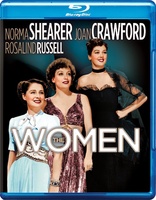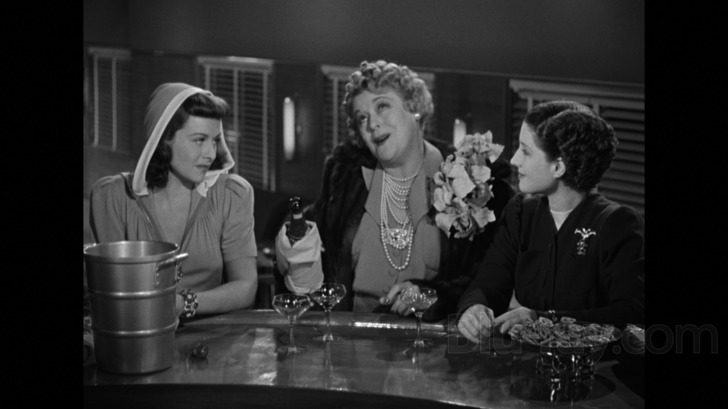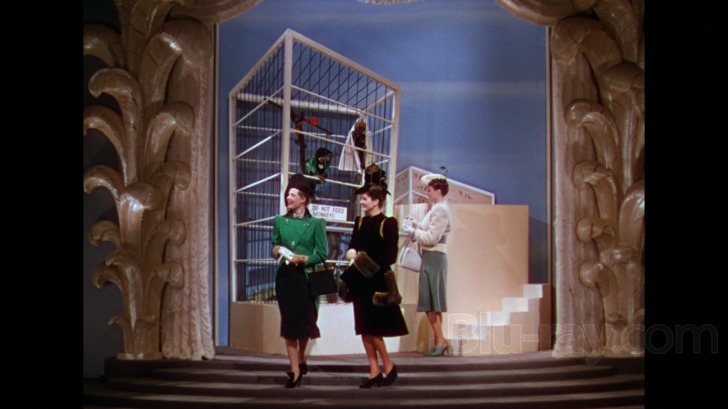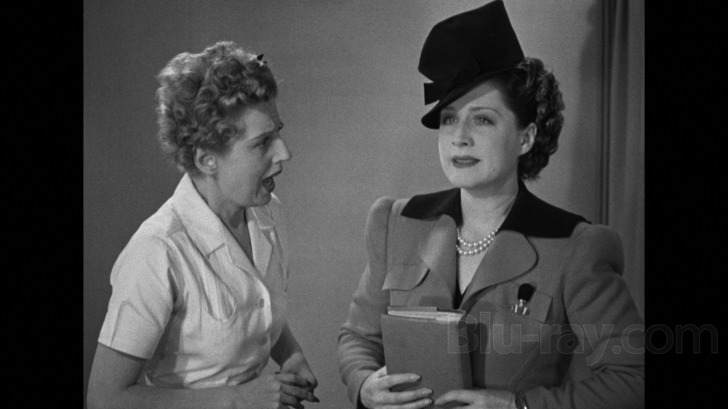The Women Blu-ray Movie
HomeThe Women Blu-ray Movie 
Warner Bros. | 1939 | 133 min | Not rated | May 06, 2014
Movie rating
7.2 | / 10 |
Blu-ray rating
| Users | 0.0 | |
| Reviewer | 4.0 | |
| Overall | 4.0 |
Overview
The Women (1939)
A happily married woman lets her catty friends talk her into divorce when her husband strays.
Starring: Norma Shearer, Joan Crawford, Rosalind Russell, Mary Boland, Paulette GoddardDirector: George Cukor
| Drama | Uncertain |
| Comedy | Uncertain |
Specifications
Video
Video codec: MPEG-4 AVC
Video resolution: 1080p
Aspect ratio: 1.37:1
Original aspect ratio: 1.37:1
Audio
English: DTS-HD Master Audio Mono (48kHz, 24-bit)
Spanish: Dolby Digital Mono (Spain)
Subtitles
English SDH, French, Spanish
Discs
50GB Blu-ray Disc
Single disc (1 BD)
Playback
Region free
Review
Rating summary
| Movie | 4.0 | |
| Video | 4.5 | |
| Audio | 4.0 | |
| Extras | 2.0 | |
| Overall | 4.0 |
The Women Blu-ray Movie Review
With Friends Like These . . .
Reviewed by Michael Reuben May 9, 2014The Women is a classic, in both the original play and the 1939 film adaptation, because there's a timeless quality to the conflicts and character types battling across its cloistered spaces. We all know a well-intentioned innocent like Mary Haines, who still believes in romance. Pot-stirrers like Sylvia Fowler still run around chattering and spreading gossip. And manipulators like Crystal Allen still break up marriages and relationships to get what they want. Look closely at Lena Dunham's Girls, and you can spot modern versions of these archetypes under all the texting, career anxiety and dysfunction. But The Women is very much a product of its time. It plays out in the hermetically sealed world of Park Avenue society in the Thirties, the American equivalent of an English drawing room. (You'd never know there was a Depression.) These are the original "ladies who lunch": pampered, idle, with plenty of time on their hands to make trouble for one another—which, in Clare Booth Luce's original Broadway hit, is exactly what women do when men aren't around. The plot depends on manners and morals of a bygone era, when belonging to the right crowd was just as important as having wealth, extramarital affairs led to social ostracism and divorce required a trip to Reno. Remove The Women from its original context, and it no longer holds up, as writer/director Diane English discovered when she tried to remake it for the modern era in 2008.

The screen adaptation of The Women by Anita Loos (Gentlemen Prefer Blondes) and Jane Murfin (the 1940 Pride and Prejudice) substantially expands the play's cast, mostly by filling in the retinue of service personnel who pamper these society ladies. The film's trailer claims a roster of 135 women. With the exception of the fashion show (discussed below), all of the expansion serves to underline the central, cynical point: Given the opportunity, women are just as dangerous as men, especially to each other. The film's chief victim is Mary Haines (Norma Shearer), the devoted wife of Stephen Haines, who, like every other man in the story, remains unseen. (Even the pets are female.) The Haines have a charming daughter, Little Mary (Virginia Weidler), and divide their time between a Manhattan apartment and a country home. Mary's happy world collapses when she discovers that Stephen is having an affair with a vamp named Crystal Allen (Joan Crawford), who works at the perfume counter at Black's Fifth Avenue. Naturally, Mary is the last to know. Her "dear" friend, Sylvia Fowler (Rosalind Russell), gets the gossip from a manicurist named Olga (Dennie Moore) at Sydney's, the fashionable salon favored by high society, and can't wait to tell everyone she knows except Mary. After visiting the perfume counter herself, Sylvia arranges for Mary to learn about the affair as cruelly as possible. Against the advice of her worldly mother (Lucile Watson), Mary confronts her husband (off screen). When chance presents the opportunity, she also confronts Crystal. Eventually she finds herself on a train to Reno in the company of her friend, Peggy Day (Joan Fontaine), who made the mistake of wanting to buy a car with her own money, thereby provoking her husband's wrath. En route, they commiserate with Miriam Aarons (Paulette Goddard), who is divorcing her own husband so that she can marry . . . well, that's a secret. They also meet the Countess De Lave (Mary Boland), who is making her third trip to Reno, because she never marries sensibly but always succumbs to "l'amour! l'amour!" The Women shifts tone when the characters reach Reno and begin their stay at the Double Bar T Ranch run by Lucy (Marjorie Main), a commonsensical rustic who's seen them come and go, year in and year out. The comedy becomes broad, the catfights get physical and the sentiment becomes more intense. When Mary Haines receives her divorce, it doesn't bring her the satisfaction she expected. Instead, she begins a two-year education that transforms her from a romantic innocent into a cat with claws. Mary has finally learned that society only appears to be civilized. In reality, it's a jungle out there. Director George Cukor was immediately hired for The Women after he was fired from Gone with the Wind (reportedly because Clark Gable didn't like him). Cukor's sure touch is evident throughout, particularly in balancing the individual performances, from Russell's rat-a-tat machine gun delivery, to Shearer's gentle sweetness (at times, you really do want to shake her and say, "Wake up!"), to Crawford's icy composure. Cukor also stages a grand opening, as the camera explores Sydney's Salon with its various rooms, services and clientele before settling on Olga, the gossipy manicurist. It's a textbook example of how to "open up" a play in a natural manner. Less successful is the lengthy fashion show that interrupts the action solely to provide what, in 1939, would have been the novelty of a Technicolor sequence in the middle of a black-and-white film. The show itself has nothing to do with the plot, and Cukor has since stated that he would have preferred to remove it. However, the parade of outfits (by MGM's resident costume designer, Adrian) does serve to confirm that high fashion could be just as bizarre and impractical 75 years ago as it is today.
The Women Blu-ray Movie, Video Quality 

Whatever source was used, Warner's 1080p, AVC-encoded Blu-ray of The Women is one of those presentations of a black-and-white classic that demonstrates the ability of the Blu-ray format to revive older films and allow them to be experienced in a way that hasn't been possible outside of revival houses (and, given the poor quality of prints in circulation, maybe not even there). The source material is either in pristine condition or, I suspect, has been extensively restored. The blacks, contrast and shades of gray are so good that the sets look like sets (which, to me, is not a criticism but a compliment). Details of the elaborate costumes can be readily distinguished, as can the hair and makeup, which have obviously been done with great care for each actress. The Technicolor fashion sequence features rich but not oversaturated hues, with no bleeding and no diminution in sharpness. The scenes may not contribute to the plot, but they're pretty to look at. The film's grain pattern is fine and appears undisturbed by digital tampering. The average bitrate of 22.95 Mbps isn't overly generous, but the compressionist was able to take advantage of the pillarbox bars at either side to conserve bits, and the image does not suffer from artifacts.
The Women Blu-ray Movie, Audio Quality 

The Women was released in mono, which is reproduced here in lossless DTS-HD MA 1.0. The track is serviceable and typical of the period, with acceptable but limited dynamic range. The dialogue is clear, except when Rosalind Russell reaches full velocity, at which point it can be difficult to keep up with her. The score by David Snell and Edward Ward is used sparingly but effectively.
The Women Blu-ray Movie, Special Features and Extras 

The extras have been ported over from Warner's 2005 DVD, with the addition of the MGM cartoon, "One Mother's Family".
- Another Romance of Celluloid (480i; 1.33:1).
- From the Ends of the Earth (10:20): This 1939 promotional short for MGM and its upcoming slate of films uses the "hook" of showing all the exotic places from which the studio acquires goods and materials for use in producing motion pictures.
- Hollywood: Style Center of the World (11:07): Paris might beg to differ, but this 1940 short makes the case that women in the American heartland (and elsewhere) want to dress like the stars they see in the movies.
- One Mother's Family (480i; 1.33:1; 8:44): The cartoon story of a protective mother hen and her brood of chicks, out for a day's stroll.
- Alternate Fashion Show Sequence (480i; 1.33:1; 6:14): This alternate take of the fashion show was filmed in black-and-white, instead of being shot separately in color. As a result, the models interact with the cast, whereas in the color version the cast disappears for the duration of the sequence.
- Scoring Stage Sessions (38:37): Audio only.
- Trailers
- The Women (1.33:1; 3.27): "135 Women with Nothing on Their Minds but Men!"
- The Opposite Sex (2.35:1, non-enhanced; 3:45): The 1956 musical remake.
The Women Blu-ray Movie, Overall Score and Recommendation 

The Women borrows elements from screwball comedy, and it has secondary characters who are there strictly for laughs, but it's a serious film at its core. For evidence, look no further than the character of Little Mary, whose struggles to comprehend what is happening to her parents are a reminder that the bloodsport being played by the adults does real and lasting damage to innocents who cannot fend for themselves. Then again, pay close attention to the long and revealing scene between Little Mary and Crystal in the latter half of the film. Despite repeated provocation, Little Mary behaves like a perfect lady, yet behind the well-mannered facade, you sense that she's watching and probing an adversary for weaknesses (and she finds some). Unlike her mother, Little Mary has caught on early. She too will soon be one of "the women"—and she'll be better prepared than her mother. Highly recommended.
Similar titles
Similar titles you might also like

Dinner at Eight
Warner Archive Collection
1933

The Awful Truth
1937

Our Dancing Daughters
Warner Archive Collection
1928

Me and Orson Welles
2008

Places in the Heart
Limited Edition to 3000
1984

Angel
1937

Much Ado About Nothing
2012

He's Just Not That Into You
2009

Christopher Strong
Warner Archive Collection
1933

Grand Hotel
1932

The Seven Year Itch
1955

Camille
Warner Archive Collection
1936

Millie
1931

It Happened One Night
1934

Stand-In
1937

It's Complicated
2009

Sleeping with Other People
Rental Copy
2015

Mr. & Mrs. Smith
Warner Archive Collection
1941

Stage Door
1937

Heartburn
1986